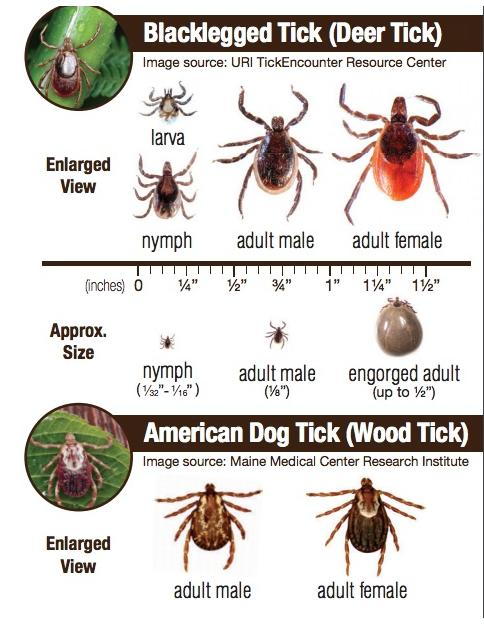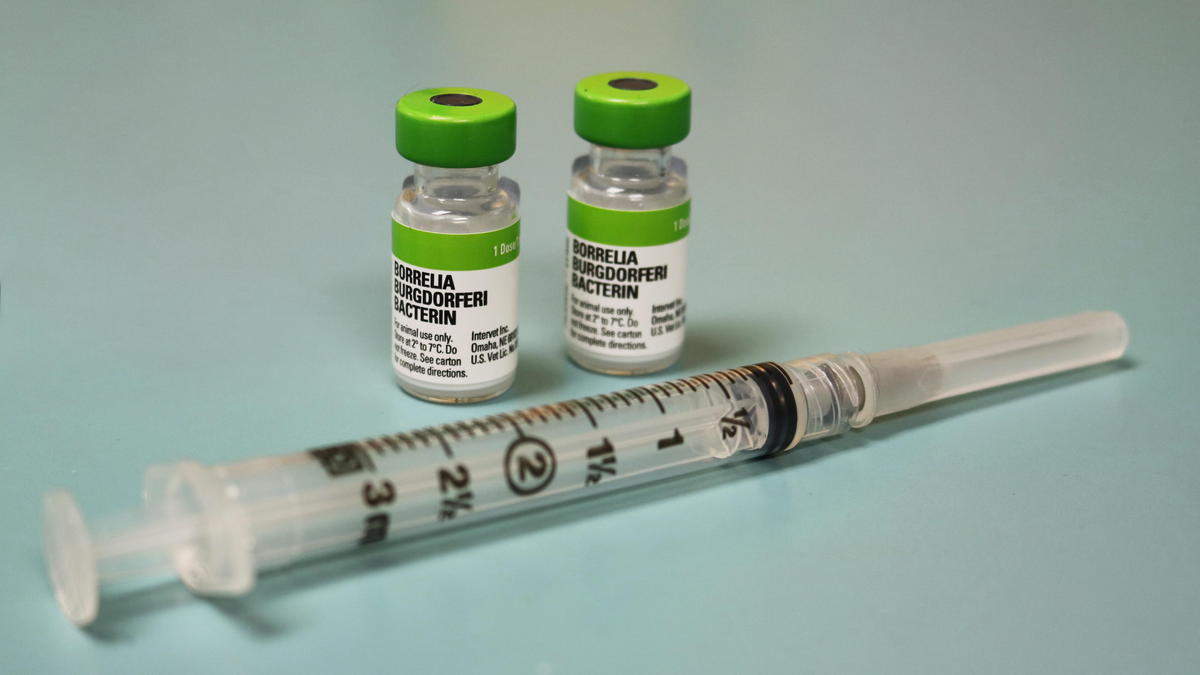Hot Topic: Lyme Disease, Ticks and the Diseases They Carry
The Tick
Lyme disease is transmitted by only one type of tick: the black-legged tick (Ixodes scapularis, previously known as the deer tick). Black-legged ticks are small. Depending on the stage (there are 3 – larva, nymph & adult) they can be poppy seed sized or a bit bigger, the engorged adult female being the largest. Engorged adult females are easy to find, but the larva and nymph sizes can be impossible to spot in a furry coat.
 Ticks prefer moist, shaded ground leaf litter, but can be found anywhere; even in the middle of a dry mowed lawn. So, although it is a good idea to avoid and clean up prime tick habitat, avoidance is not going to be 100% effective. We do tend to see more ticks in the spring and fall months but they are present all year round – Hot, dry day in August? Your pet may get a tick. --Mild day in February? Your pet may get a tick.
Ticks prefer moist, shaded ground leaf litter, but can be found anywhere; even in the middle of a dry mowed lawn. So, although it is a good idea to avoid and clean up prime tick habitat, avoidance is not going to be 100% effective. We do tend to see more ticks in the spring and fall months but they are present all year round – Hot, dry day in August? Your pet may get a tick. --Mild day in February? Your pet may get a tick.
Ticks and Disease in Nova Scotia
There are 14 different species of ticks in Nova Scotia. The 3 most common found on dogs are the American dog tick, blacklegged tick and the groundhog tick.
If you find a tick on your dog how do you know which one it is? Well, most of the time you will not know for sure. If the tick has any white patches on its scutum (the small oval structure just behind the head) then all we know for sure is it is NOT a Blacklegged tick. But the black-legged tick and the groundhog tick are almost impossible to tell apart unless examined by an entomologist with a microscope.

Do you need to know what kind of tick was on your dog? Well, actually, not really. It doesn’t change anything we do. Yes, if it was a black-legged tick there is a risk of Lyme disease, but other species of ticks also may carry disease. If your dog has symptoms (fever, lethargy, lameness, not eating) we will test for Lyme disease and other tick borne diseases regardless of whether or not we know what type of tick was on your pet.
Other Tick Borne Diseases
Everybody has heard that ticks carry Lyme disease, but few people are aware that Lyme is only one of many diseases that ticks can carry. We won’t go into details here, but other tick borne organisms may cause illness in you and your pets. The names are longer and not as easy to pronounce so the media

doesn’t pick up on them, but they are a cause for concern and are found here in Nova Scotia. The Lyme test that we run also screens for two of these other diseases: Anaplasma (carried by the black-legged tick) & Ehrlichia (carried by the brown dog tick, American dog tick and the lone star tick).
There are many more diseases carried by ticks; a few that may be found in Eastern Canada are: Babesia (carried by the black-legged tick and brown dog tick), Rocky Mountain Spotted Fever (carried by the American dog tick, brown dog tick and lone star tick) and Bartonella (present in many species of ticks).
Lyme Basics
Not every tick carries Lyme disease and not every dog exposed to Lyme disease will get sick. Actually most dogs’ immune systems are able to fight off the infection and 90-95% of the dogs exposed to Borrelia will NOT get Lyme disease.

At its simplest, Lyme disease is a bacterial infection treatable with a course of antibiotics. Unfortunately, Lyme disease is not always simple. Complications can arise in certain individuals where the immune system is affected. This can trigger kidney problems, neurological problems, heart disease or chronic arthritis.
Why do these complications happen in certain individuals? Why do some individuals get Lyme disease when exposed to Borrelia and others don’t? We just don’t know. Lyme disease is difficult to study in both dogs and humans so for some aspects of the disease there are still more questions than answers.
The classic symptoms of Lyme disease in dogs are fever, lethargy, reduced appetite, pain, stiffness and lameness. Dogs don’t seem to get erythema migrans (the classic target shaped rash lesions that humans can get).
Lyme Testing
For dogs we have a screening test – Idexx 4DX. It is a blood test and can be run in the clinic. It tests for Lyme disease as well as two other tick borne diseases (Anaplasma and Ehrlichia) and heartworm. The 4DX test tests for exposure to the Borrelia organism. So, if the test is positive it means your dog has been  exposed to the organism that causes Lyme disease at some point in the past. If the test is positive PLUS your dog is showing the typical symptoms we will treat with the appropriate antibiotics. But if your dog is healthy with no symptoms, all a positive test means is that your dog was exposed at some point in the past. Dogs with Lyme positive 4DX test do not necessarily need treatment and may never get sick from Lyme disease.
exposed to the organism that causes Lyme disease at some point in the past. If the test is positive PLUS your dog is showing the typical symptoms we will treat with the appropriate antibiotics. But if your dog is healthy with no symptoms, all a positive test means is that your dog was exposed at some point in the past. Dogs with Lyme positive 4DX test do not necessarily need treatment and may never get sick from Lyme disease.
A more specific test for active Lyme infections is an antibody titre test called Quant C6. This is not meant to be a screening test, but is an additional test that can be run if the 4DX is positive to distinguish between an active infection and a previous exposure. This is a blood test that we send away, so it will take several days to get the results. An active infection will typically have a higher antibody level. It is recommended that this test be repeated in 3-6 months to make sure the treatment has worked (antibody levels are lower).
Other tests may be necessary, depending on your dog’s symptoms. These may include blood tests like CBCs or chemistry panels to check organ function, urine tests and x-rays.
Lyme Vaccine
There is a Lyme vaccine available for dogs. Currently we are recommending this vaccine be added if you are finding a lot of ticks on your dog (finding them daily or several times a week). We are not adding it in as a routine vaccine as there are still some questions about effectiveness and the length of time it lasts.

The other concern with the vaccine is a false sense of security for dog owners. Even if your dog is vaccinated for Lyme disease you still need to use a good tick preventative as we can’t vaccinate for any of the other diseases ticks carry and the vaccine may not be 100% effective.
Prevention
 Preventing Lyme and other tick borne disease requires a multifaceted approach. Avoiding prime tick habitat is helpful, as is checking your dog thoroughly every day. Lyme vaccine is an option for some. It is also recommended that your dog be on some form of tick preventative. There are a variety of these available: we carry Bravecto, Nexguard, Advantix and Revolution. It is best to discuss with your veterinarian which one is best for your pet. They all have advantages and disadvantages depending on whether you prefer an oral or a topical medication, whether your pet swims or not, age of your pet and effectiveness against other types of parasites.
Preventing Lyme and other tick borne disease requires a multifaceted approach. Avoiding prime tick habitat is helpful, as is checking your dog thoroughly every day. Lyme vaccine is an option for some. It is also recommended that your dog be on some form of tick preventative. There are a variety of these available: we carry Bravecto, Nexguard, Advantix and Revolution. It is best to discuss with your veterinarian which one is best for your pet. They all have advantages and disadvantages depending on whether you prefer an oral or a topical medication, whether your pet swims or not, age of your pet and effectiveness against other types of parasites.

Cats and Lyme
In theory Borrelia organisms are capable of infecting cats but to date there have been no confirmed cases of Lyme disease in cats. There is no Lyme vaccine for cats. As time goes on we may find out more about cats and Lyme disease but at this point we recommend an effective tick preventative in all cats that spend time outside as cats can get some of the other diseases that ticks carry.
Our knowledge of Lyme disease is continuing to evolve. As further information becomes available it is inevitable that testing, treatment recommendations, vaccines and tick preventatives will evolve as well. In the meantime, our current toolbox of tick preventives are highly effective and are recommended for year round use, consider discussing with your veterinarian whether the Lyme vaccine is right for your dog, and check your dog daily for ticks.

Links
Here are a few links with additional information that you might want to check out:
http://www.petsandparasites.org/dog-owners/ticks/
http://www.petsandparasites.org/dog-owners/ticks/
https://www.petmd.com/dog/conditions/infectious-parasitic/c_dg_lyme_disease
